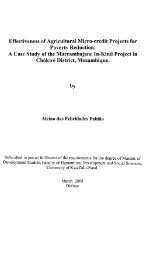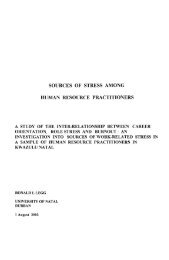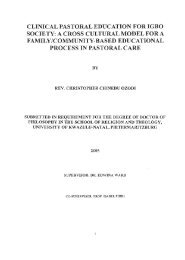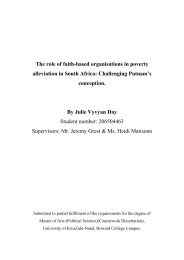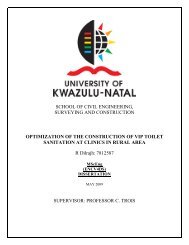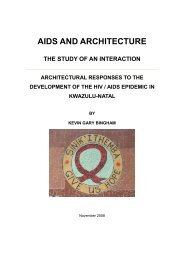View/Open - ResearchSpace - University of KwaZulu-Natal
View/Open - ResearchSpace - University of KwaZulu-Natal
View/Open - ResearchSpace - University of KwaZulu-Natal
You also want an ePaper? Increase the reach of your titles
YUMPU automatically turns print PDFs into web optimized ePapers that Google loves.
“… The DoH gives us a batch <strong>of</strong> everything in kits and we should divide the kits amongst<br />
ourselves and then sign for them but the thing is these things are little such that they do not<br />
last up to the time you get new ones. So for example, you find that most <strong>of</strong> us have bedridden<br />
patients that need a lot <strong>of</strong> nappies/diapers and we have 5 to 10 patients on the minimum so<br />
this would mean that the other patients won’t have materials because the ones in the kits only<br />
last for one day by the time you go to other patients you have nothing. They should add all<br />
these things and give us items for the whole month and I should sign for them. For example<br />
they give us toilet paper in the kits it is only one roll and suppose you use all <strong>of</strong> it on one<br />
person what happens if you go to the next patient? You have one tablet <strong>of</strong> soap for bathing<br />
the patient and the same soap you use it for washing! What happens when you reach the 2 nd<br />
or 3 rd patient? Everything in the kits is limited, and it’s not enough!”<br />
4.6.2 Insufficient supply <strong>of</strong> HBC kits<br />
(Focus group 8, organisation H)<br />
Since April, 2011 the DOH in trying to create jobs in health care facilities employed most <strong>of</strong><br />
the volunteer caregivers from most home-based care organisations to work as community<br />
health workers in local clinics. For this reason it cut down the supply <strong>of</strong> HBC kits in HBCOs<br />
by supplying most <strong>of</strong> the materials to clinics. There is no evidence that shows that there were<br />
strategies put in place to deal with this challenge. This has resulted in shortages <strong>of</strong> kits in<br />
HBCOs. As HIV/AIDS continues to affect communities, PLWHA need on going assistance<br />
from volunteer caregivers. However, insufficient supply <strong>of</strong> HBC kits means that volunteer<br />
caregivers cannot provide the quality care that is needed by their patients. Findings show that<br />
therefore as one home-based care coordinator said:<br />
“… It has been and still is the responsibility <strong>of</strong> the department <strong>of</strong> health to provide HBCOs<br />
with materials. Ever since the DOH got our volunteer caregivers this year, it stopped<br />
supplying us with materials as though we do not function anymore. They delay giving us! they<br />
only give us when they feel like! It can be 2 weeks or even months without receiving anything.<br />
So I went to the department <strong>of</strong> health and asked them that since now that you do not supply us<br />
with the material regularly, who is going to supply the materials for HBC? They said ‘go to<br />
the clinics because we also don’t have enough money to buy these materials and supply them<br />
to you’! And so at the clinics they say that No! No..!! No!! We don’t have funds for HBC<br />
materials they are only for the clinic!’ I just don’t know how we are going to perform our<br />
duties because right now we really don’t have any material to use!” (HBCC, organisation B)<br />
To deal with all these challenges, most HBCCs tried to purchase some gloves, but they failed<br />
due to lack <strong>of</strong> funds. Some tried to ask for donations from well-wishers through friendship<br />
and connections that they created with other organisations. One HBCC said:<br />
50





